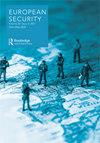Unpacking postcolonial and masculine anxieties: Hungary and Turkey’s responses to the EU’s handling of the 2015–2016 refugee “crisis”
IF 3.6
2区 社会学
Q1 AREA STUDIES
引用次数: 2
Abstract
ABSTRACT In this article, we examine the Hungarian and Turkish responses to the EU’s handling of the 2015 refugee “crisis” through a postcolonial feminist IR framework. Drawing on hypermasculinity, we argue that both countries utilise migration to overcome their postcolonial and masculine anxieties by confronting their positions within the international hierarchies. Our examination of policy statements and speeches by Viktor Orbán and Recep Tayyip Erdoğan between 2015 and 2016 reveals three masculinised responses. First, both leaders portray themselves as acting out of paternal authority, while painting the EU as weak or inhumane. Second, they depict the EU as incompetent and their countries as competent providers of security. Third, they present themselves as protectors of European values, and the EU as in need of protection. These rhetorics suggest that both leaders used the “crisis” to challenge the current international hierarchy. Despite this, we argue that they are only concerned with their countries’ rankings within the hierarchy, not the system itself. Our postcolonial feminist reading of the “crisis” reveals that these masculinised framings are in fact counterproductive and only serve to confirm both Hungary and Turkey’s positions at the bottom of the international hierarchies, and their subordination to the EU as the EU’s others.解构后殖民和男性焦虑:匈牙利和土耳其对欧盟处理2015-2016年难民“危机”的回应
在本文中,我们通过后殖民女性主义IR框架考察匈牙利和土耳其对欧盟处理2015年难民“危机”的反应。利用超级男子气概,我们认为这两个国家都利用移民来克服他们的后殖民和男性焦虑,通过面对他们在国际等级制度中的地位。我们研究了维克多Orbán和雷杰普塔伊普Erdoğan在2015年至2016年间的政策声明和演讲,发现了三种男性化的回应。首先,两位领导人都把自己描绘成行使父亲权威的人,同时把欧盟描绘成软弱或不人道的人。其次,他们把欧盟描述为无能,把他们的国家描述为称职的安全提供者。第三,他们把自己描绘成欧洲价值观的保护者,而欧盟需要得到保护。这些言辞表明,两位领导人都利用“危机”来挑战当前的国际等级制度。尽管如此,我们认为他们只关心他们国家在等级制度中的排名,而不是系统本身。我们对“危机”的后殖民女性主义解读表明,这些男性化的框架实际上适得其反,只会证实匈牙利和土耳其在国际等级制度中的底层地位,以及它们作为欧盟其他成员国从属于欧盟的地位。
本文章由计算机程序翻译,如有差异,请以英文原文为准。
求助全文
约1分钟内获得全文
求助全文

 求助内容:
求助内容: 应助结果提醒方式:
应助结果提醒方式:


